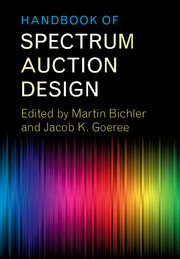Book contents
- Frontmatter
- Contents
- List of Contributors
- Preface
- List of Papers
- Part I The Simultaneous Multiple-Round Auction
- Part II The Combinatorial Clock Auction Designs
- Part III Alternative Auction Designs
- Part IV Experimental Comparisons of Auction Designs
- Part V The Bidders’ Perspective
- 31 Winning Play in Spectrum Auctions
- 32 Up in the Air: GTE's Experience in the MTA Auction for Personal Communication Services Licenses
- 33 Bidding Complexities in the Combinatorial Clock Auction
- 34 Strategic Bidding in Combinatorial Clock Auctions – A Bidder Perspective
- 35 Impact of Budget Constraints on the Efficiency of Multi-lot Spectrum Auctions
- Part VI Secondary Markets and Exchanges
- Outlook
- References
31 - Winning Play in Spectrum Auctions
from Part V - The Bidders’ Perspective
Published online by Cambridge University Press: 26 October 2017
- Frontmatter
- Contents
- List of Contributors
- Preface
- List of Papers
- Part I The Simultaneous Multiple-Round Auction
- Part II The Combinatorial Clock Auction Designs
- Part III Alternative Auction Designs
- Part IV Experimental Comparisons of Auction Designs
- Part V The Bidders’ Perspective
- 31 Winning Play in Spectrum Auctions
- 32 Up in the Air: GTE's Experience in the MTA Auction for Personal Communication Services Licenses
- 33 Bidding Complexities in the Combinatorial Clock Auction
- 34 Strategic Bidding in Combinatorial Clock Auctions – A Bidder Perspective
- 35 Impact of Budget Constraints on the Efficiency of Multi-lot Spectrum Auctions
- Part VI Secondary Markets and Exchanges
- Outlook
- References
Summary
Introduction
Since being pioneered by the U.S. in 1994, simultaneous ascending auctions have become a common mechanism to allocate spectrum rights. Spectrum auctions can involve billions of dollars and companies bidding in these auctions regularly create specialized bidding teams and hire experts in auction theory to develop bidding strategies. Nevertheless, the results can be surprising. In the FCC's auction of Advanced Wireless Service spectrum, price arbitrage failed so dramatically that one new entrant was able to purchase essentially nationwide coverage for about a third (more than a billion dollars) less than what incumbent carriers paid for equivalent spectrum in the same auction. At the same time, the other prospective nationwide entrant exited the auction early and filed a letter with the FCC claiming that the auction rules disadvantaged new entrants!
Results of this sort raise questions for economists. Does the apparent failure of the Law of One Price indicate a fundamental flaw in auction design? If not, why must such auctions be complicated? What are the issues that create strategic complexity for bidders? And to what extent can the tools of economic theory provide insights that facilitate effective bidding in highly complex environments?
We start by explaining some of the reasons why large spectrum auctions are necessarily complicated, and why the Law of One Price can fail so dramatically in a spectrum auction.We emphasize two difficulties facing bidders: exposure problems, which are essentially the problems of bidders wishing to acquire complementary licenses, and budget constraints, which we argue are ubiquitous.We explain why these difficulties make bidding in simultaneous ascending auctions complicated, and also why they would complicate bidding in other auction designs.
Exposure problems create fundamental difficulties for a new entrant seeking to compete head-to-head with incumbent nationwide wireless carriers in the US. Such an entrant needs to acquire adequate bandwidth in every major metropolitan area, but because licenses covering cities or regions are sold individually, the entrant could commit to spending billions of dollars winning spectrum licenses before discovering that the total price for the bundle of licenses it seeks makes the whole entry unaffordable or unprofitable. It could then be left to dispose of extensive holdings at fire-sale prices.
- Type
- Chapter
- Information
- Handbook of Spectrum Auction Design , pp. 689 - 712Publisher: Cambridge University PressPrint publication year: 2017
References
- 2
- Cited by



